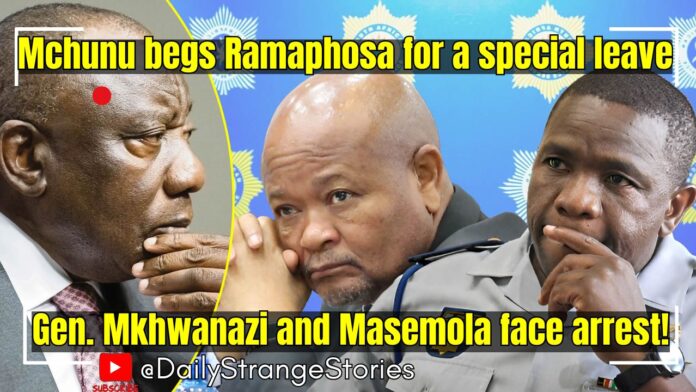In the heart of South Africa, a storm is brewing within the highest echelons of power, threatening to expose a web of alleged corruption, political interference, and clandestine relationships. At the center of this unfolding drama is Senzo Mchunu, the under-fire police minister, whose future hangs precariously in the balance. The narrative takes a dramatic turn with Mchunu's urgent request to President Cyril Ramaphosa for special leave, a move that underscores the gravity of the accusations leveled against him.
The request for leave came amidst mounting pressure for Mchunu's removal, fueled by explosive allegations of his association with individuals suspected of possessing state secrets and interfering with police investigations. The saga began to unfold publicly following a media briefing by KwaZulu-Natal police commissioner Nhlanhla Mkhwanazi, who made startling claims of ministerial interference and the protection of politically connected individuals who had run afoul of the law.
President Ramaphosa, now caught in the crossfire, is reportedly considering a range of options, including a judicial commission of inquiry with a swift six-week turnaround, to address the crisis. However, the decision is fraught with political risk. A report from the State Security Agency has warned of potential unrest should Ramaphosa take action against Mkhwanazi, raising the specter of widespread protests fueled by public frustration with crime.
Other options under consideration include a cabinet reshuffle, which could see Mchunu moved from his current portfolio. Nobuhle Nkabane, the higher education minister, may also be affected by such a reshuffle. However, any action taken by Ramaphosa must also account for the delicate internal dynamics within the African National Congress (ANC), particularly in KwaZulu-Natal, where the party suffered significant losses in the previous elections. Removing Mchunu and Nkabane, both prominent figures from the province, could further destabilize the political landscape.
Mkhwanazi's revelations have exposed deep divisions within the police force, with rival factions vying for control of the crime intelligence division. This internal conflict is characterized by the spread of misinformation, deceit, and lies, posing a significant threat to national security.
Mkhwanazi has also alleged that Mchunu's directive to disband the police task team on political killings violated established procedure, as National Commissioner Fannie Masemola was allegedly sidelined from the decision-making process.
Adding another layer of complexity, the Investigating Directorate Against Corruption (Idac) is reportedly investigating Mkhwanazi and Masemola for possible tender corruption amounting to over R6.7 million. Law enforcement sources suggest that Mkhwanazi's media briefing was a preemptive attempt to garner public support and thwart any potential arrest by Idac. The case against them involves allegations of receiving cash bribes from Inban Kistiah, a Durban businessman implicated in corruption, who secured the R6.7 million tender in 2016.
The relationship between Masemola, Mkhwanazi, and Dumisani Khumalo, the head of crime intelligence, dates back to at least 2011, when Jacob Zuma appointed Mkhwanazi as acting police commissioner. Mkhwanazi then appointed Masemola to head crime intelligence, who in turn brought Khumalo into the unit. Khumalo's tenure was short-lived, but he later returned to a senior position in 2022. It is alleged that Kistiah, who is also facing corruption charges alongside former national police commissioner Khomotso Phahlane, was awarded a tender to provide 200 bulletproof vests for ballistic testing at an inflated price of R33,000 per vest. Kistiah also allegedly attempted to sell a R45 million communications interception tool to the police ahead of the ANC's elective conference in 2017.
Adding to the intrigue, Masemola, Mkhwanazi, and other top police officials reportedly attended a presentation on bulletproof vests overseas, during which it is alleged that the two generals received luxury gifts as bribes. Masemola has previously denied these allegations, and has also denied any involvement in the disbanding of the political killings task team. However, a publicly available letter from Mchunu to Masemola, dated 31 December 2024, instructs him to halt the filling of posts in crime intelligence, review police operations at ports of entry, and close the political killings task team.
Despite Masemola's denials, documentation suggests that he was actively involved in the discussions surrounding the disbanding of the task team. On 3 January 2025, Masemola's staff officer sent an email instructing that Mchunu's instructions be implemented and a close-up report be submitted by 14 January 2025. Further documentation reveals that Masemola presented an update on the process in a meeting with Mchunu on 27 March. Following instructions from Masemola’s office, his deputy instructed that the task team be deactivated, citing an assessment that it no longer significantly contributed to policing efforts.
Adding another layer to the narrative, Mchunu's decision to scrap the task team was reportedly triggered by a complaint to parliament's portfolio committee on police by activist Mary de Haas. She called for the disbandment of the task team and an audit of its funding, alleging excessive expenditure by its members, including accommodation at luxury establishments. The complaint was also sent to Masemola in November 2024.
In a parallel development, Mchunu has reportedly urged President Ramaphosa to launch an independent investigation into the allegations against him, with a swift two-month deadline for findings. Mchunu is also expected to appear before the ANC's integrity commission to present his side of the story. Sources indicate that Ramaphosa has expressed frustration over the allegations and is feeling the pressure to act decisively. The president reportedly demanded a detailed account of the situation from Mchunu during their meeting in JOHANNESBURG.
Defenders of Mchunu have pointed to unresolved scandals involving Ramaphosa, drawing parallels to Mchunu's situation. Mchunu's inner circle is advocating for total transparency to clear his name and is emphasizing his proactive approach in presenting himself to the ANC integrity commission. They argue that Mchunu intervened to prevent potential financial mismanagement, citing internal communications dating back to March 2024. These communications reveal requests for substantial funding for the political killings task team, raising concerns about potential overspending and the team's effectiveness.
On Thursday, Ramaphosa summoned Mkhwanazi to a meeting in Gauteng, where he requested evidence and sought clarification on the allegations. As a result, Mkhwanazi had to extend his stay to provide further information, causing him to miss a raid in Durban.
As a concerned citizen, how do you want President Ramaphosa to handle this situation? Tell us your answer in the comments section below.

Follow Us on Twitter











